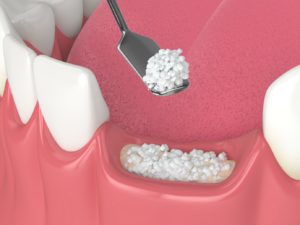 Many patients who wish to get dental implants have lost some bone density and volume in their jaw. In order for their implants to succeed, they have to undergo a dental bone graft. That prospect might seem a little intimidating, but it is nothing to worry about. You should feel virtually nothing during the procedure itself. Afterward, you will need to go through a recovery period. What can you expect while you are on the mend? Here are some important details about the recovery process:
Many patients who wish to get dental implants have lost some bone density and volume in their jaw. In order for their implants to succeed, they have to undergo a dental bone graft. That prospect might seem a little intimidating, but it is nothing to worry about. You should feel virtually nothing during the procedure itself. Afterward, you will need to go through a recovery period. What can you expect while you are on the mend? Here are some important details about the recovery process:
Every Case Is Different
Not all bone grafts are the same, nor are all patients. Here are a few factors that can influence your recovery timeline and your level of post-treatment discomfort:
- The type and extent of the bone graft. There are multiple types of dental bone grafts. All of them involve exposing the bone in order to fortify it with donor bone, artificial bone, or a patient’s own bone from another part of their body. However, the extent of the surgery varies from patient to patient.
- Your health and age. Younger patients with no serious medical conditions may bounce back more quickly than older patients or those with chronic health problems. If you have diabetes or any other condition that impedes your body’s ability to heal, you should make sure it is well-managed.
Average Recovery Time
It can take quite a while for a graft to successfully integrate with your existing bone structure. In many cases, patients must wait for several months following a graft to receive a dental implant. (In some cases, however, a bone graft and implant placement are performed simultaneously.)
The good news is that your post-surgical discomfort will not last nearly that long. In fact, the soft tissues in the mouth can heal quite quickly, which means that any discomfort could begin to dissipate within several days after your procedure. You may be feeling normal within a few weeks.
Tips for a Smooth Recovery
Do not let the bone graft recovery process scare you. As long as you follow your dental team’s post-op instructions, you are unlikely to run into any serious problems. They may suggest that you:
- Eat soft foods
- Keep your head propped up on a pillow while you rest
- Avoid smoking
- Take pain relievers as needed
- Avoid strenuous physical exertion
- Use a cold compress to minimize swelling
- Be extremely careful when brushing your teeth so you do not irritate your surgical site
- Rinse with salt water to minimize inflammation
- Call your dentist if you notice signs of an infection or other complications
A bone graft might seem a little intimidating, but it is an important stepping stone on the way to getting dental implants. Fortunately, most patients enjoy a smooth and surprisingly easy treatment experience.
Meet the Practice
Drs. Erin Page provides top-quality oral health services to the Schenectady community, including advanced dental implant care. If you are curious about your tooth replacement options, our team would be pleased to answer your questions. Contact us at 518-374-0317.
